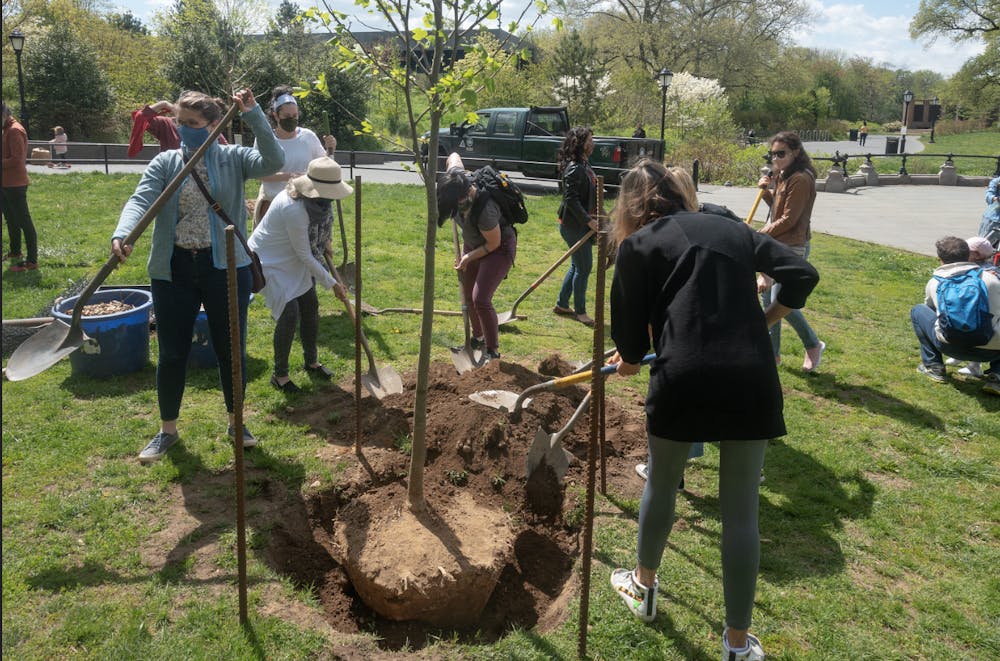By Myara Gomez
Staff Writer
Arbor Day is a day when everyone gets to come together and appreciate nature. This could be by planting a tree or going on a hike. Instead, the College, New Jersey’s Department of Environmental Protection (NJDEP) and Sustainable Jersey had other plans, collaborating to create the Trees for Schools Grant Program. According to NJDEP, the overall grant of 2.5 million dollars is funded by the Regional Greenhouse Gas Initiative auction proceeds.
The Trees for Schools Grant Program was made to give grants to New Jersey schools, colleges and universities so they can plant trees on their campus. There will be grants between $10,000 and $500,000 to cover the various costs of maintaining the trees being planted.
“Whereas a grant would reduce the impact to our budget, it would not increase the amount of trees we plant each year,” said Mike Weber, the manager of landscape, grounds and automotive at the College. “Unfortunately, due to our existing canopy, underground utilities and ongoing construction, it is very difficult to find new places to plant trees.”
He made it a point that there is currently no need to plant more trees on campus because there is not much room on campus to plant them due to construction and current trees. “If the grant could be expanded to shrub replacement throughout campus, that would have a significant impact,” Weber said, adding “We have sufficient funds for tree planting, however, shrub replacement is significantly more expensive.”
Although this program is wonderful for New Jersey schools, colleges and universities, the College has been lucky enough to have a generous budget for landscaping on campus, especially in the tree department as Weber stated. Unfortunately, the grant program doesn’t extend to other plants which the campus needs the most.
Weber has been working at the College for 25 years, having joined as a grounds worker in 1997 and knows the landscaping of this campus like the back of his hand. He mentioned that the landscaping crew at the College plants every year, where workers remove hazardous or dead trees and replace them with new ones. All the trees they plant are native to the state of New Jersey, such as white oaks, maples, white pine and tulip poplars. These plants tend to be more resistant to diseases and insects compared to trees they have shifted away from; red oak, ash and elm trees.
He also implemented a tree plan to help save the trees on our campus, which he developed about five years ago. This plan entailed placing all of the trees in maintained areas, marking them with GPS, identifying what tree species they were, and evaluating the health, safety and ecological benefits of each of them. The evaluation was completed by certified arborists, not College facilities employees.
His department began to remove any hazardous trees to promote safety on campus, soil tested and fertilized the area, prune dead parts of the trees and replace the trees that were removed. He mentioned that the plan is not complete and is currently in year three out of four in the process.
“If there are any trees that need to be removed in the wooded areas or the Ecological Forest on campus, those trees will not be replaced as they are naturally replaced by saplings,” Weber said.
Other institutions could benefit greatly from this grant program because the amount given is to cover all types of maintenance they need over a three year period.
“Increasing tree cover means soaking up more stormwater runoff, providing shade that can reduce heat island effects and energy use, and reducing greenhouse gasses that fuel climate change by naturally sequestering carbon,” said NJ Commissioner of Environmental Protection Shawn M. LaTourette said in the NJDEP release.
The Department of Environmental Protection also stated that 40 percent of the grant will be for those in overburdened communities that apply for the program. According to NJDEP, overburdened communities are low-income households, minorities and households with limited English proficiency. This is in accordance with President Biden’s Justice40 Initiative.
If a student would like more information about the Trees for Schools grant program, they may reference the news release by the NJDEP.







